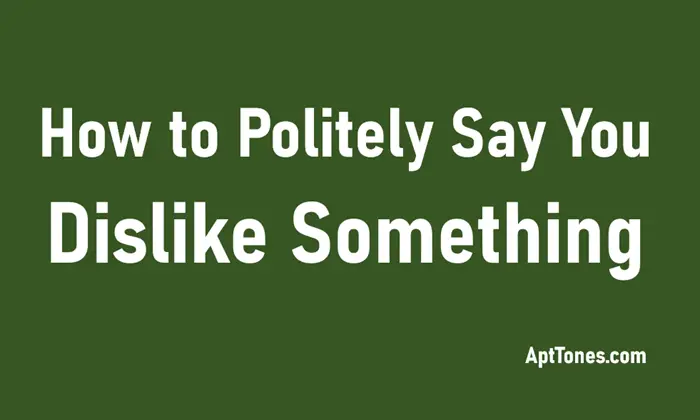In both personal and professional contexts, expressing dislike can be a tricky endeavor. It’s often necessary to convey your true feelings while also maintaining a level of politeness and respect. The art of expressing dislike without offending someone is an invaluable skill in effective communication.
This article explores some polite ways to express your aversion to something. Each method is tailored to ensure that your message is conveyed with tact, respect, and clarity.
Polite Ways to Say You Dislike Something

1. “It’s not really my cup of tea.”
Response: “It’s not really my cup of tea.”
Appropriateness: This phrase is a classic, polite way of saying that something doesn’t suit your tastes or preferences without being offensive.
Example Dialogue:
Friend: “Did you like the movie we watched last night?”
You: “It’s not really my cup of tea, but I can see why others might like it.”
2. “I appreciate it, but it’s not quite what I’m looking for.”
Response: “I appreciate it, but it’s not quite what I’m looking for.”
Appropriateness: This response is ideal when you want to acknowledge the effort or thought behind something while gently declining or expressing your dislike.
Example Dialogue:
Colleague: “How do you like the proposal I drafted?”
You: “I appreciate the effort you’ve put in, but it’s not quite what I’m looking for. Maybe we could try a different approach?”
3. “I’m not a huge fan of it.”
Response: “I’m not a huge fan of it.”
Appropriateness: This phrase is a mild way of expressing dislike. It’s particularly useful in situations where you want to be honest yet non-confrontational.
Example Dialogue:
Friend: “Do you like this genre of music?”
You: “I’m not a huge fan of it, but I can see why you enjoy it.”
4. “I tend to prefer something else.”
Response: “I tend to prefer something else.”
Appropriateness: This is a subtle way of stating your preference for something different, without directly criticizing the current option.
Example Dialogue:
Colleague: “Do you like using this software for our projects?”
You: “I tend to prefer a different software, but I’m open to working with this one if it suits the team better.”
5. “That’s interesting, but not really my style.”
Response: “That’s interesting, but not really my style.”
Appropriateness: Acknowledging that the subject is interesting while stating that it doesn’t align with your personal style is a respectful way to express your feelings.
Example Dialogue:
Friend: “What do you think about the latest fashion trends?”
You: “That’s interesting, but not really my style.”
6. “I respect your opinion, but I see it differently.”
Response: “I respect your opinion, but I see it differently.”
Appropriateness: This response shows that you value the other person’s view while clearly stating that your perspective differs.
Example Dialogue:
Colleague: “Don’t you think our current strategy is effective?”
You: “I respect your opinion, but I see it differently. Perhaps we could consider alternative strategies.”
7. “It doesn’t resonate with me, but I understand its appeal.”
Response: “It doesn’t resonate with me, but I understand its appeal.”
Appropriateness: This phrase is ideal for acknowledging the general appeal of something while expressing that it does not align with your personal preferences.
Example Dialogue:
Friend: “Isn’t this song great?”
You: “It doesn’t resonate with me personally, but I understand its appeal to others.”
8. “I’m sure it’s great for some, just not for me.”
Response: “I’m sure it’s great for some, just not for me.”
Appropriateness: This polite response emphasizes that while something may be suitable or enjoyable for others, it doesn’t align with your preferences.
Example Dialogue:
Friend: “Do you enjoy extreme sports?”
You: “I’m sure they’re great for some, just not for me.”
9. “I have a different preference at the moment.”
Response: “I have a different preference at the moment.”
Appropriateness: This phrase is a gentle way of stating that your current preferences differ from what is being presented or discussed.
Example Dialogue:
Colleague: “Do you think we should continue with this marketing plan?”
You: “I have a different preference at the moment, but I’m open to discussing it more.”
10. “That hasn’t been my experience, but I’m glad you enjoy it.”
Response: “That hasn’t been my experience, but I’m glad you enjoy it.”
Appropriateness: This response is particularly effective when your experience with something has been different from the other person’s, and you want to acknowledge their positive experience.
Example Dialogue:
Friend: “This restaurant is amazing, don’t you think?”
You: “That hasn’t been my experience, but I’m glad you enjoy it.”